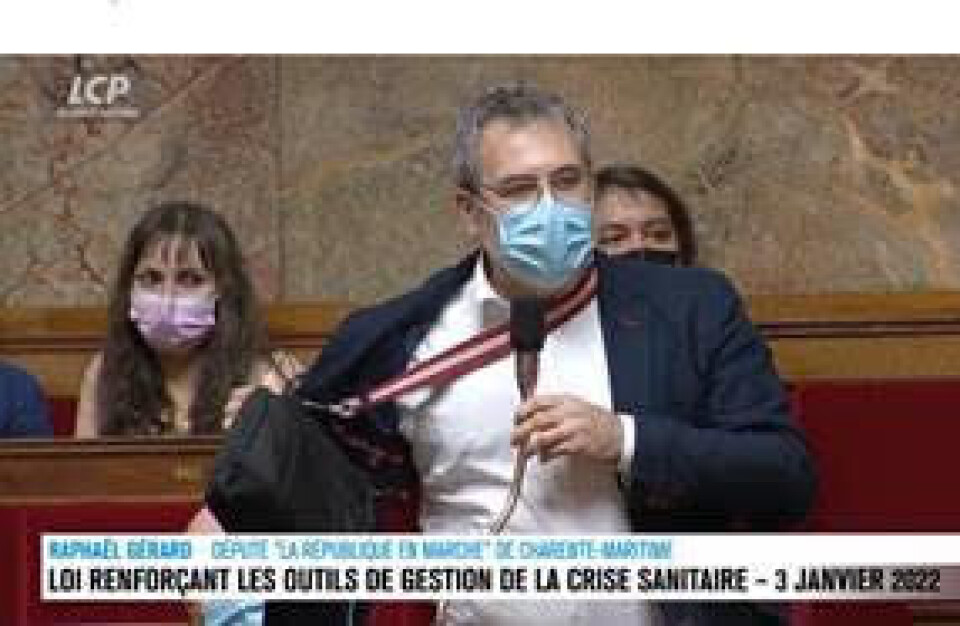-
Travel and transport: What's new in France in 2026
From mini-bus trains to flight operator changes
-
Six good news stories from France in 2025
From revolutionary eye surgery and sporting successes, to successful fundraising for iconic French brands, the year was full of feel-good news
-
Why is New Year's Eve known as Réveillon de la Saint-Sylvestre in France?
You may have heard French friends use this term but they might not know where it comes from
French Covid vaccine pass law held up as opposition contests bill
The government was aiming to introduce the passes by mid-January. It still hopes to keep close to this timing

UPDATE (13:38, December 4, 2022): The bill concerning the introduction of a vaccine pass will be debated again in the Assemblée nationale this evening (December 4) from 18:00, after being postponed on Monday night
The government’s aim to replace the Covid health pass with a vaccine pass by mid-January has hit a snag as opposition MPs voted to delay the reading of the bill during a session in the Assemblée nationale late last night (January 3).
The government had hoped to adopt the bill by the end of this week, with the measure coming into force by the middle of this month. This schedule has now been thrown into question by the delay in parliament.
A new date for when the bill will be examined again at the Assemblée nationale will be decided today by the conférence des présidents.
Government spokesman Gabriel Attal said this morning that the government was still aiming to keep the schedule “as close as possible to what was planned”.
Text had 600 amendments
“Yesterday evening we saw a form of irresponsible alliance being formed…to derail the timetable for the adoption of the vaccine pass,” he said, describing the coming together of opposition parties from the left and right of the political spectrum to contest the measure.
Annie Genevard, MP for Les Républicains (centre-right) and vice president of the Assemblée nationale, who was presiding over the debate, denied that the suspension was irresponsible, and said the issue was more due to “a problem with the organisation of parliamentary time”.
“We had a text with over 600 amendments and two open sessions. I have never seen a text with so many amendments that could pass in such a short time, it is not possible,” she said.
“There was an error of assessment on the part of the majority, who thought that we could examine more than 600 amendments in a few hours.
She said it would be possible to find time this week to finish the reading of the bill and that this suspension should not prevent the law coming into force by January 15.
Why did the opposition delay the bill?
Before the session at the national assembly, several opposition parties stated they would oppose the bill.
The introduction of a vaccine pass is controversial as it essentially serves to make Covid vaccinations mandatory for anyone who wishes to visit public places or go to restaurants or cafes.
France’s health minister Olivier Véran stated this fact himself in an interview with Brut on December 18, saying that the measure is “a disguised form of compulsory vaccination”.
"Le pass vaccinal est une forme déguisée d'obligation vaccinale."
— Brut FR (@brutofficiel) January 3, 2022
Du refus de la vaccination obligatoire en mai 2021 jusqu'au vote à l'Assemblée nationale, voilà comment le gouvernement a évolué sur le pass vaccinal. pic.twitter.com/Z5EKSYsxIh
During yesterday’s parliamentary session, left-wing party La France insoumise, led by Jean-Luc Mélenchon, far-right party the Rassemblement national (RN), led by Marine Le Pen, and right-wing party Les Républicains (LR), who will be represented by Valérie Pécresse at this year’s presidential elections, all came together to contest the bill.
The debate began yesterday afternoon, but an influx of amendments to the bill led the session to run late.
At midnight, when the house should normally close, a vote took place to maintain the session, but opposition MPs voted against the idea. As there were not enough MPs from the government’s majority in attendance, the opposition won the vote and the session was ended.
At the time of the suspension, there were still over 500 amendments to the bill to be adopted.
“The RN MPs voted for the suspension, a victory for democracy,” Ms Le Pen said.
“We can no longer accept that debates on health restrictions, which have an impact on the lives and freedoms of our compatriots, take place at night far from the eyes of the French,” she said.
Julien Aubert, an MP for LR, said the delay was a “slap in the face for the government”.
“[They] told us that we had to walk or die…Now the government is stuck and was abandoned by part of its own majority.”
‘An insult to those who died’
Raphaël Gérard, an MP for ruling party La République En Marche (LREM), criticised those who opposed the bill.
“Every one of your gestures is an insult to the people who died,” he said. Mr Gérard himself suffered a severe form of Covid during the first wave of the pandemic in March 2020 and nearly died. He had heart issues shortly after, and is still suffering from the after-effects.
“We are talking about a subject that has caused approximately 130,000 deaths [in France], that has caused tens of thousands of people who, like me - and you know what stages I went through - will have to live for the rest of their lives with the consequences of Covid.
“We can talk about freedom, we can brandish freedom in all directions, but freedom is not a set of rights, it is a set of duties and a set of rights, it is a fair balance between rights and duties.
“My freedom today is 30cm of cable and three kilos of equipment that I carry 24 hours a day for the rest of my life," he said, holding up a bag containing medical equipment that he wears over his shoulder.
In France, 124,014 people have died of Covid in hospital.
Read more:Coronavirus: Daily updates on the situation in France

What is the vaccine pass?
A vaccine pass will be required to enter the majority of public spaces, leisure activities and interregional transport services - as is currently the case for health passes.
However, it will mean that a person must be vaccinated against Covid to access these places and services, with a negative Covid test no longer sufficient.
Under the bill presented, the vaccine pass would be mandatory for everyone aged 12 and over.
It remains unclear whether three vaccine doses will be required to have a vaccine pass, or if two doses (with the second less than seven months prior) will still be sufficient.
For children aged 12 to 17 who cannot yet receive a booster dose, it would be improbable that they would need three doses to get a vaccine pass.
The government has suggested that a person with one Covid vaccine dose can use a negative Covid test to get a valid vaccine pass.
Related articles
Covid boosters, vaccine passes: What changes in France on January 15?
France reduces time gap to get Covid booster jab to keep health pass























